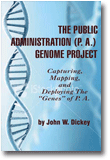
The Public Administration (P. A.) Genome Project
Capturing, Mapping, and Deploying the "Genes" of P. A.
By:
John W. Dickey, Virginia Tech
Published 2009
What is it? The Public Administration Genome Project (PAGP) is a grand attempt to digitally “map” and then usefully employ the full set of topics, variables, and interrelationships that comprise and involve all of the “genes” that make up public administration. It is based on the highly regarded and useful Human Genome Project.
Why do it? Like the world in general, the P. A. world is becoming more diverse and complicated. Hence, few administrators can be expected to know, much less remember, the many relevant strategies, external forces and related impacts that might be part of a particular situation. There thus is a need for a comprehensive, logic-based, readily accessible system (called “COMPASS”) to help in finding and elaborating on such topics, variables, and interrelationships.
What is in the book? It starts with a broad overview of the whole PAGP. It then turns to an elaboration of both the basic and then the more comprehensive analogies with the human genome; the Human Genome Project; and other related concepts (like catalysis and evolution).
These are followed by a set of new and seemingly unconnected subjects: (a) norms for citizens and public administrators, and (b) semantic and syntactic analyses. Then come some interesting and diverse case studies, and comparisons of such to theories.
All these set the scene for development of procedures for contributing to and using COMPASS, the information and guidance system which is the central product of the PAGP. The whole concept of the PAGP subsequently is revisited through an example that encompasses all of its major elements and processes.
The last part of the book focuses on future directions, asking questions like “Is the PAGP (and COMPASS) an impossible dream or a much needed reality?”
REVIEWS
"[John Dickey] is an ex transport planner and urban modeller who later moved into public policy, urban affairs and planning, and he is well known for writing the CyberQuest (CQ) software - an early, multimedia attempt at computer-assisted brainstorming with which small groups can generate action plans. Later he developed Quantitative CyberQuest (QCQ) which also tries to generate plans but, instead of relying upon the mysteries of human creativity to do so, uses the power of the modern computer to list goals, external variables, intermediate variables, reaction times and their inter-relationships, which ultimately suggests which plans might usefully be tried – plan generation.
This latest book goes one step further. It uses not only the power of the modern computer to suggest strategies but also the power of the internet." Ray Wyatt University of Melbourne
""Dickey’s aim is clear, and so are the broad contours of his methodology. His process relies on what he labels “bottom-up†and “top-down†approaches. Th e former involves extracting words from public administration textbooks and case studies; contributors from around the world submit source cases to a data website known as COMPASS (COMprehensive PA Support System). In the latter approach, Dickey shows a list of 41,000 general dictionary words to a sample of public administrators and asks them to identify those that are important to them. Th e fi rst methodology produced a list of 14,000 variables and 15,000 relationships; from the second approach came a list of approximately 13,000 word stems."" Ulf Zimmermann Kennesaw State University in Public Administration Review
-
Paperback978-1-60752-212-6
Web price: $45.04 (Reg. 52.99)
-
Hardcover978-1-60752-213-3
Web price: $80.74 (Reg. 94.99)
- eBook978-1-61735-843-2

- BUS041000 - BUSINESS & ECONOMICS: Management
- EDU037000 - EDUCATION: Research
- POL017000 - POLITICAL SCIENCE: Public Affairs & Administration
-
 (Re)Envisioning Social Studies Education Research
Current Epistemological and Methodological Expansions, Deconstructions, and Creations
(Re)Envisioning Social Studies Education Research
Current Epistemological and Methodological Expansions, Deconstructions, and Creations
-
 Dark and Destructive Leadership
Dark and Destructive Leadership
-
 Distance Learning
Volume 20 #3
Distance Learning
Volume 20 #3
-
 Distance Learning
Volume 20 #4
Distance Learning
Volume 20 #4
-
 Diversity, Equity, and Inclusion Insights in Practice
Diversity, Equity, and Inclusion Insights in Practice
-
 Qualitative Research With Diverse and Underserved Communities
Qualitative Research With Diverse and Underserved Communities
-
 The Entrepreneurship SIG at the European Academy of Management
Setting the Base for Tomorrow's Challenges
The Entrepreneurship SIG at the European Academy of Management
Setting the Base for Tomorrow's Challenges

